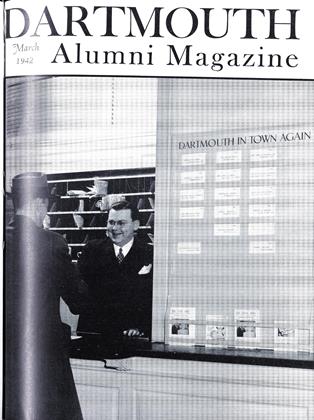THE BEGINNING OF WHAT IS EXPECTED TO BECOME A CRITICAL ENROLLMENT problem for the College was seen at the start of the second semester, when registration figures disclosed a shrinkage of 145 undergraduates since the opening of the college year. Although this is twice the withdrawal figure for the same period last year when total enrollment was higher, it will perhaps strike alumni as a relatively slight drop until it is translated into a financial loss of nearly $50,000 in tuition and dormitory charges. Student withdrawals continue at a steadily mounting rate, and an undergraduate enrollment of less than 2,000 is a distinct possibility before the end of the college year, May 10.
Financial problems for Dartmouth as a result of the war were important among the discussions of the Board of Trustees at its Hanover meeting on February 14, and at the special meeting of the faculty early last month and again at a Boston meeting of Alumni Fund leaders a few days later President Hopkins spoke frankly about the difficult days ahead for the College. He estimated the deficit for the current year at from $150,000 to $200,000 and spoke of probably much greater deficits to come.
Coupled with the steadily increasing loss in tuitions and dormitory rentals are heavy new demands for financial aid from students who wish to take advantage of the accelerated, three-term schedule but whose family resources can hardly be stretched to meet the greater annual cost. President Hopkins, with Trustee sanction, has promised that the College will do everything possible to help the conscientious men in this marginal group and to compensate for their loss of summer earnings. He has made known his intention to utilize the backlog of the Hopkins 25th Anniversary Fund, raised by alumni last year, to help meet the financial-aid problem which has been created by the wartime acceleration of college work.
To the faculty President Hopkins has reported the conviction of the Trustees that it would be shortsighted policy for the College to emasculate itself by drastic reduction of the education it offers or by cutting salaries and losing the strength of its teaching staff. The opportunity is presented to Dartmouth to emerge relatively stronger after the war by adopting a strong and courageous policy now, however great the deficit, he declared. Until forced to abandon it, Dartmouth will follow such a policy.
The difficulties envisaged by President Hopkins and the Trustees are related fundamentally to the inevitable loss of students to the armed forces and war industries. Approximately one thousand undergraduates are now registered for Selective Service, following the additional registration of 650 students over 20 years of age in mid-February, and college administrators generally anticipate the further lowering of the draft age to 18. Requirements for the Army Air Corps have recently been lowered to eliminate the need of any college training, and in order to meet the requirements of the V-5 Naval aviation program many Dartmouth students are frankly interested in completing only the required four semesters of work.
On the much smaller cheerful side, the V-7 program for training deck officers still requires a college degree, and directives from General Hershey of Selective Service headquarters have instructed local boards to give serious consideration for deferment to men pursuing engineering, medical, and industrial management courses. Enrollment in Dartmouth's three associated schools has remained relatively stable, although Tuck School started its second semester with 100 men compared to 114 at the beginning of the year.
 View Full Issue
View Full Issue
More From This Issue
-
 Article
ArticleTrials, Tribulations, Success
March 1942 By RALPH SANBORN '17 -
 Sports
SportsBig Green Teams
March 1942 -
 Class Notes
Class Notes1917*
March 1942 By EUGENE D. TOWLER -
 Class Notes
Class Notes1937*
March 1942 By DONALD C. MCKINLAY -
 Article
ArticleIndians Scout for the Fleet
March 1942 By LT. E. F. PLANK, UNITED STATES NAVAL RESERVE -
 Class Notes
Class Notes1931*
March 1942 By CHARLES S. MCALLISTER







